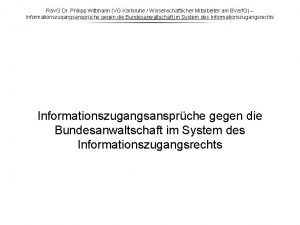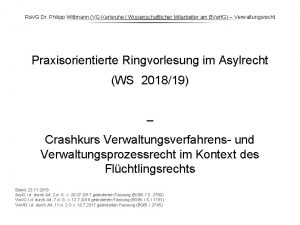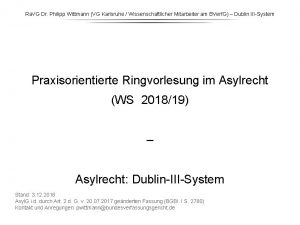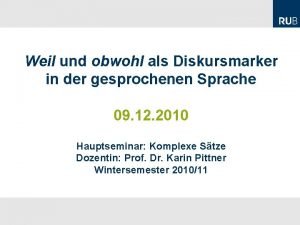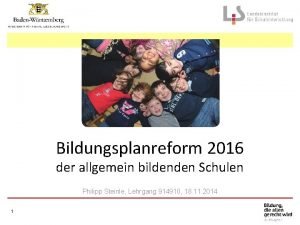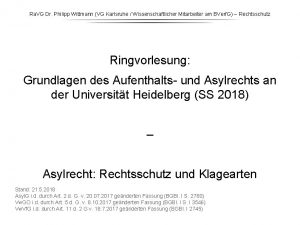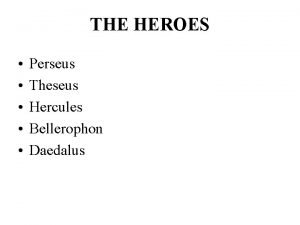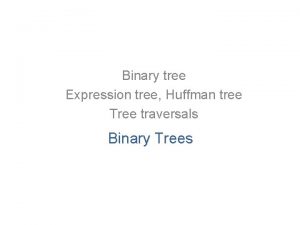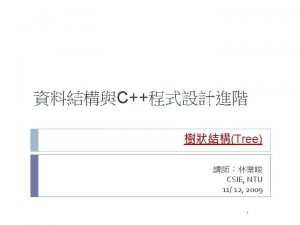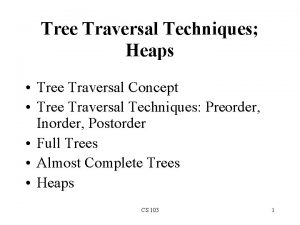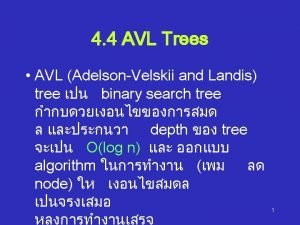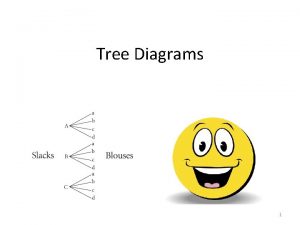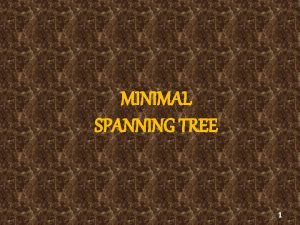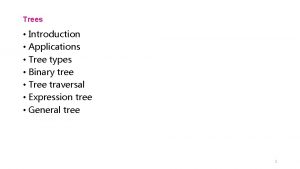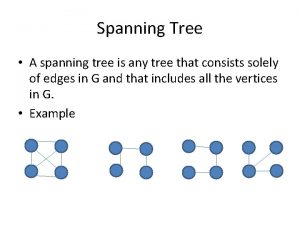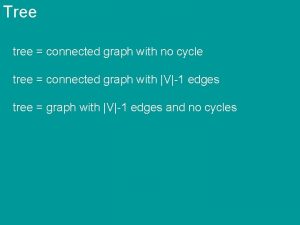Philipp Chapkovski European University Institute Advanced o Tree






























- Slides: 30

Philipp Chapkovski European University Institute Advanced o. Tree University of Mainz June 4 -5, 2018 Custom models – Public Good Game

PGG with punishment stage • 2 stages: • Contribution • Punishment • at Punishment stage participants observe decisions at Contribution stage. • They can’t spend more than they have

Our Task:

Our Task:

Balliet, D. , & Van Lange, P. A. (2013). Trust, punishment, and cooperation across 18 societies: A meta-analysis. Perspectives on Psychological Science, 8(4), 363379.

Our Task: • Scalable code (from 3 to 6 players) • Getting info about punishment sent and received • At Punishment stage show them contributions of others • Do not let them spend more than X in total on punishment • Leaving an option to run PGG without punishment under some treatments

Two ways of doing it • Using ‘normal’ o. Tree fields • Using custom models

getattr, setattr • If you need to set or get an attribute of a class (model? ) you can use • getattr(Class. Name, Attribute. Name) • print(self. player. contribution) • print(getattr(self. player, ’contribution’) • setattr(Class. Name, Attribute. Name, Value) • where Attribute. Name is a string

Punishment fields pun 1, pun 2, pun 3, pun 4, pun 5, pun 6 = [models. Currency. Field() for i in range(6)] def set_payoff(self): self. payoff = self. pd_payoff - self. punishment_sent - self. punishment_received def set_punishment(self): puns_sent = [getattr(self, 'pun{}'. format(p. id_in_group)) for p in self. get_others_in_group()] self. punishment_sent = sum(puns_sent) puns_received = [getattr(p, 'pun{}'. format(self. id_in_group)) for p in self. get_others_in_group()] self. punishment_received = sum(puns_received) * Constants. punishment_factor

zip • You can create two dimensional arrays in Python (aka tables in normal life) using zip • zip(a, b) creates an array with two columns, and n rows • you can loop through them by: a = [1, 2, 3] b = ['a', 'b', 'c'] for i, j in zip(a, b): print(i, j(

Punishment page class Punishment(Page): form_model = 'player' def get_form_fields(self): return ['pun{}'. format(p. id_in_group) for p in self. player. get_others_in_group()] def vars_for_template(self): others = self. player. get_others_in_group() form = self. get_form() data = zip(others, form) return {'data': data} def error_message(self, values): tot_pun = sum([int(i) for i in values()]) if tot_pun > self. player. punishment_endowment: return 'You can't send more than {} in total'. format(self. player. punishment_endowment)

Punishment tempate >table class="table-hover table-striped"> <thead> <tr> <th>Player: </th> <th>Contibution</th> <th>Deduction tokens</th> </tr> </thead> {% for i, j in data %} <tr> <td>Player {{ forloop. counter }}</td> <td>{{ i. contribution }}</td> <td>{% formfield j label='' %}</td> </tr> {% endfor %} </table<

Extra info • get form fields in vars_for_template def vars_for_template(self): form = self. get_form() • get field id on template: {{ field_name. id_for_label }}

Foreign. Key relational databases • we can split the data sheet into two tables (Persons, Houses) and the information stops being redundant

Foreign. Key relational databases • we can split the data sheet into two tables (Persons, Houses) and the information stops being redundant

Foreign. Key relational databases • class definition: structure of the data: • class instance: the specific ‘record’ of the data

Django Database structure Subsession Participant Session Group Player

Django ORM from otree. models import Session, Participant class Intro(Page): def is_displayed(self): cursession = Session. objects. get(pk=self. session. pk) participants = cursession. participant_set. all() for p in participants: print(p. code) # Results in the same output as: for p in self. session. get_participants(): print(p. code)

Stage 1: Contribution Player Contribution Payoff after Stage 1 P 1 10 130 P 2 20 120 P 3 30 110 P 4 40 100 Endowment: 100 Coefficient: 1. 6

Stage 2: Punishment Sender Receiver Amount P 1 P 2 0 P 2 P 3 5 P 3 P 4 10 P 2 P 1 2 P 3 3 P 2 P 4 0 Max punishment endowment: 20 Punishment factor: 3

a model linking senders and receivers • class Punishment(djmodels. Model): sender = djmodels. Foreign. Key(to=Player, related_name='punishments_sent') receiver = djmodels. Foreign. Key(to=Player, related_name='punishments_received') amount = models. Integer. Field(null=True, )

Creating punishment records • class Subsession(Base. Subsession): def creating_session(self): for p in self. get_players(): for o in p. get_others_in_group(): Punishment. objects. create(sender=p, receiver=o, )

Setting max punishment payoff • class Player(Base. Player): …. def set_punishment_endowment(self): assert self. pd_payoff is not None, 'You have to set pd_payoff before setting punishment endowment' self. punishment_endowment = min(self. pd_payoff, Constants. punishment_endowment)

Formset factory • we create a new file called forms. there we make our formset factory: • PFormset = inlineformset_factory(Player, Punishment, formset=Punishment. Formset, extra=0, can_delete=False, fk_name='sender', fields=['amount']) formset paratemeter is NOT necessary. • we need it to check that amount of total punishments is less than punishment endowment

formset • class Punishment. Formset(Base. Inline. Form. Set): def clean(self): super(). clean() if any(self. errors): return amounts = [] punishment_endowment = self. instance. punishment_endowment form in self. forms: amounts. append(form. cleaned_data['amount']) if sum(amounts) > punishment_endowment: raise Validation. Error( "In total you can't send more than {endowment} points!". format( endowment=punishment_endowment))

anatomy of o. Tree • every page (and many views in Django) has get and post methods • They are executed when a page is shown, and when the form is submitted correspondingly • on get o. Tree checks the is_displayed and redirects further if it is false • on post o. Tree checks the errors in a form, executes before_next_page and redirects further

page Punishment • class Punishment(Page): def vars_for_template(self): return {'formset': PFormset(instance=self. player)} def post(self): context = super(). get_context_data() formset = PFormset(self. request. POST, instance=self. player) context['formset'] = formset context['form'] = self. get_form() if formset. is_valid(): allpuns = formset. save(commit=True) else: return self. render_to_response(context) return super(). post()

after everyone has made punishment decisions • class After. Punishment. WP(Wait. Page): def after_all_players_arrive(self): self. group. set_punishments() for p in self. group. get_players(): p. set_payoff()

setting punishment • class Group(Base. Group): def set_punishments(self): for p in self. get_players(): p. set_punishment() • class Player(Base. Player): … def set_punishment(self): self. punishment_sent = sum([i. amount for i in self. punishments_sent. all()]) self. punishment_received = sum( [i. amount for i in self. punishments_received. all()]) * Constants. punishment_factor

setting payoffs • class Player(Base. Player): def set_payoff(self): self. payoff = self. pd_payoff - self. punishment_sent - self. punishment_received
 Philipp chapkovski
Philipp chapkovski Otree devserver
Otree devserver Philipp chapkovski
Philipp chapkovski Wolfgang philipp european commission
Wolfgang philipp european commission European embedded control institute
European embedded control institute European astrobiology institute
European astrobiology institute European telecommunications standards institute
European telecommunications standards institute European institute for innovation and sustainability
European institute for innovation and sustainability Philipp gerke
Philipp gerke Dr. philipp wittmann
Dr. philipp wittmann Dr. philipp wittmann
Dr. philipp wittmann Dr. philipp wittmann
Dr. philipp wittmann Philipp dorok
Philipp dorok Georg philipp friedrich von hardenberg
Georg philipp friedrich von hardenberg Suicide
Suicide Philipp steinle
Philipp steinle Złota gęś baśń
Złota gęś baśń Claudia philipp
Claudia philipp Michael kunerth
Michael kunerth Dr. philipp wittmann
Dr. philipp wittmann Philipp bertelsmeier
Philipp bertelsmeier Philipp thiessen
Philipp thiessen Z rotation
Z rotation Philipp liegl
Philipp liegl Philipp gilbert städte und gemeindebund
Philipp gilbert städte und gemeindebund Philipp mager
Philipp mager Philipp reichen
Philipp reichen Philipp fidler
Philipp fidler Philipp jester
Philipp jester Philipp gaissert
Philipp gaissert Philip lah
Philip lah









